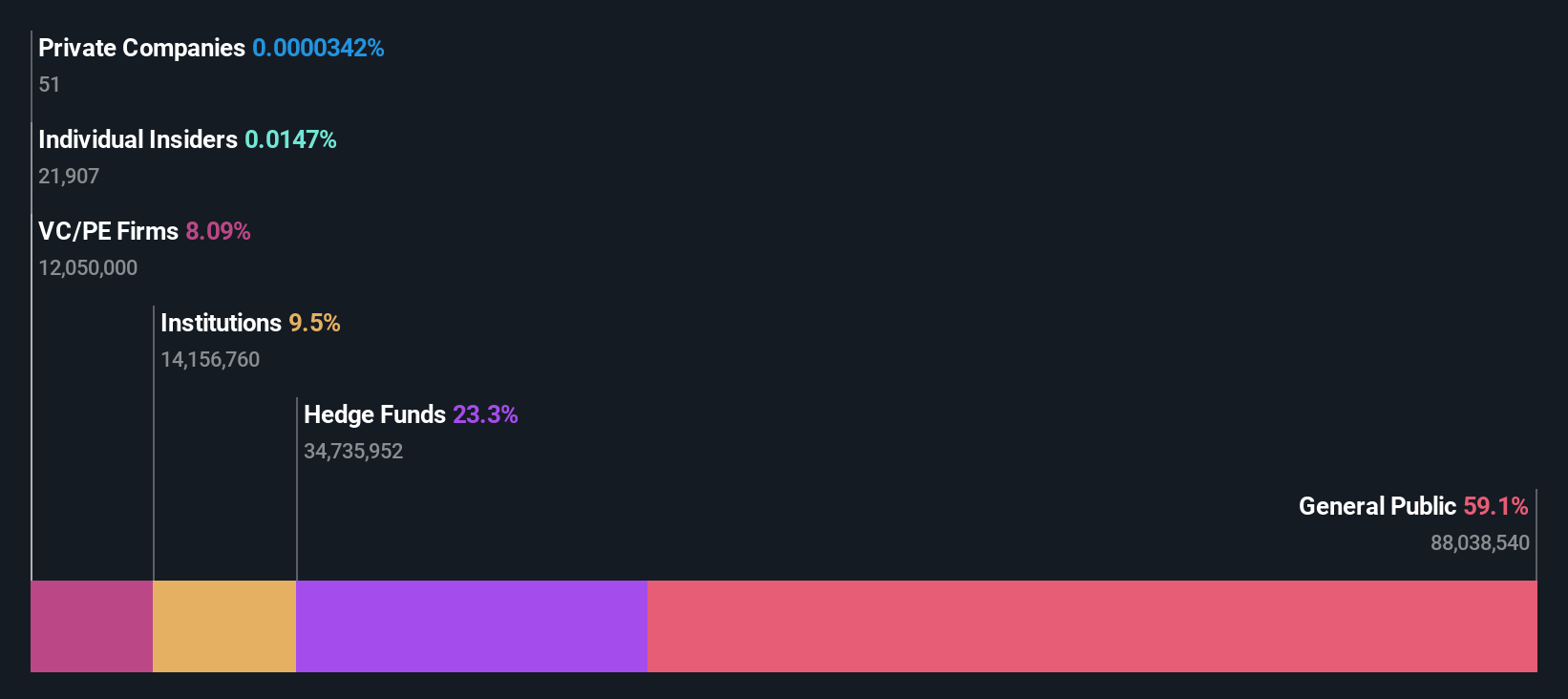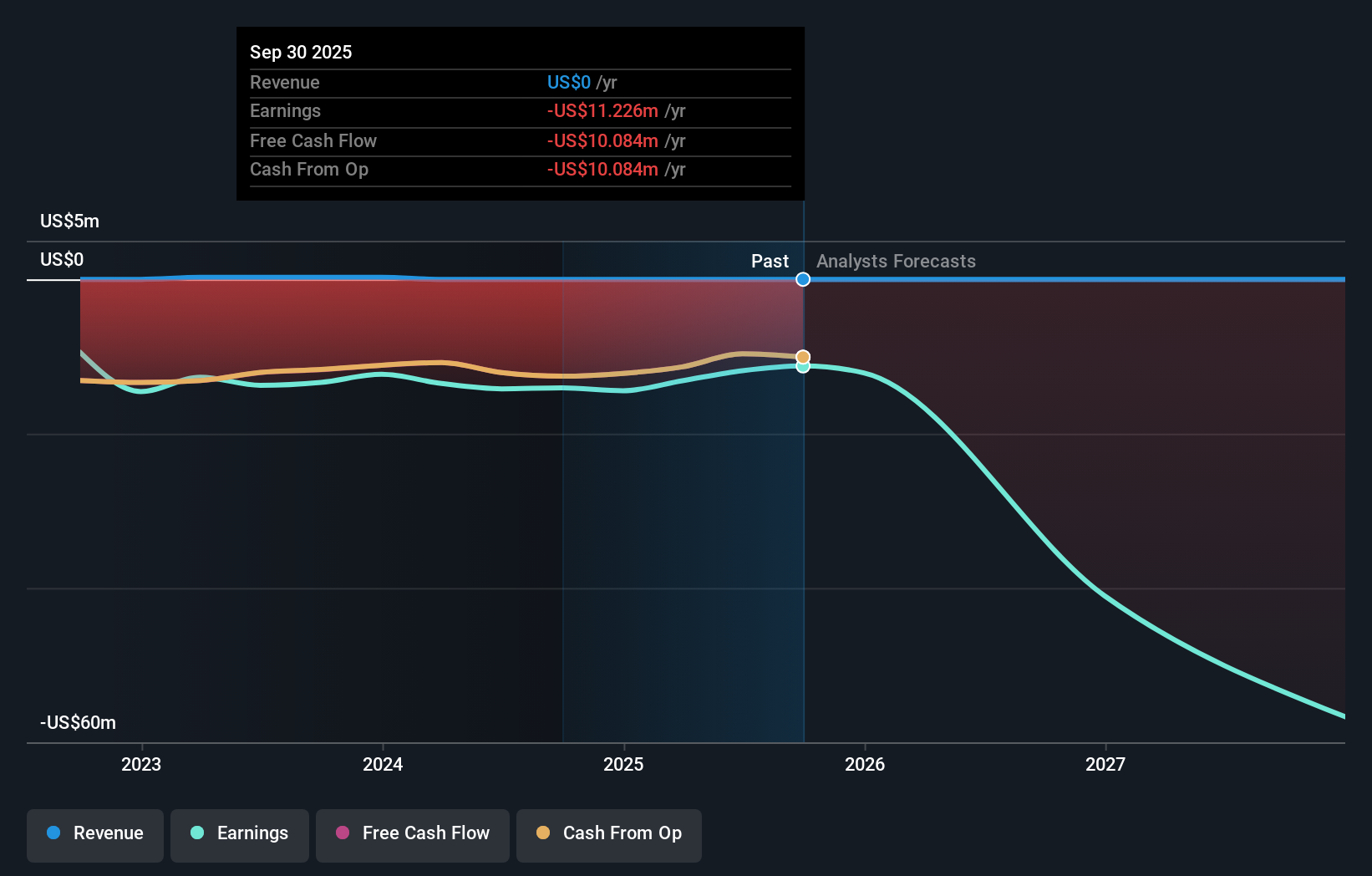- United States
- /
- Biotech
- /
- NasdaqCM:PALI
Individual investors are Palisade Bio, Inc.'s (NASDAQ:PALI) biggest owners and were rewarded after market cap rose by US$70m last week
Key Insights
- Palisade Bio's significant individual investors ownership suggests that the key decisions are influenced by shareholders from the larger public
- The top 25 shareholders own 34% of the company
- Ownership research along with analyst forecasts data help provide a good understanding of opportunities in a stock
A look at the shareholders of Palisade Bio, Inc. (NASDAQ:PALI) can tell us which group is most powerful. And the group that holds the biggest piece of the pie are individual investors with 59% ownership. In other words, the group stands to gain the most (or lose the most) from their investment into the company.
Clearly, individual investors benefitted the most after the company's market cap rose by US$70m last week.
Let's delve deeper into each type of owner of Palisade Bio, beginning with the chart below.
Check out our latest analysis for Palisade Bio

What Does The Institutional Ownership Tell Us About Palisade Bio?
Institutional investors commonly compare their own returns to the returns of a commonly followed index. So they generally do consider buying larger companies that are included in the relevant benchmark index.
As you can see, institutional investors have a fair amount of stake in Palisade Bio. This suggests some credibility amongst professional investors. But we can't rely on that fact alone since institutions make bad investments sometimes, just like everyone does. It is not uncommon to see a big share price drop if two large institutional investors try to sell out of a stock at the same time. So it is worth checking the past earnings trajectory of Palisade Bio, (below). Of course, keep in mind that there are other factors to consider, too.

Our data indicates that hedge funds own 23% of Palisade Bio. That worth noting, since hedge funds are often quite active investors, who may try to influence management. Many want to see value creation (and a higher share price) in the short term or medium term. The company's largest shareholder is Perceptive Advisors LLC, with ownership of 8.1%. For context, the second largest shareholder holds about 6.3% of the shares outstanding, followed by an ownership of 5.5% by the third-largest shareholder.
Our studies suggest that the top 25 shareholders collectively control less than half of the company's shares, meaning that the company's shares are widely disseminated and there is no dominant shareholder.
While it makes sense to study institutional ownership data for a company, it also makes sense to study analyst sentiments to know which way the wind is blowing. Quite a few analysts cover the stock, so you could look into forecast growth quite easily.
Insider Ownership Of Palisade Bio
The definition of an insider can differ slightly between different countries, but members of the board of directors always count. Company management run the business, but the CEO will answer to the board, even if he or she is a member of it.
Most consider insider ownership a positive because it can indicate the board is well aligned with other shareholders. However, on some occasions too much power is concentrated within this group.
Our most recent data indicates that insiders own less than 1% of Palisade Bio, Inc.. It has a market capitalization of just US$323m, and the board has only US$48k worth of shares in their own names. Many tend to prefer to see a board with bigger shareholdings. A good next step might be to take a look at this free summary of insider buying and selling.
General Public Ownership
The general public -- including retail investors -- own 59% of Palisade Bio. This level of ownership gives investors from the wider public some power to sway key policy decisions such as board composition, executive compensation, and the dividend payout ratio.
Private Equity Ownership
With a stake of 8.1%, private equity firms could influence the Palisade Bio board. Some might like this, because private equity are sometimes activists who hold management accountable. But other times, private equity is selling out, having taking the company public.
Next Steps:
While it is well worth considering the different groups that own a company, there are other factors that are even more important. Take risks for example - Palisade Bio has 5 warning signs (and 4 which are significant) we think you should know about.
Ultimately the future is most important. You can access this free report on analyst forecasts for the company.
NB: Figures in this article are calculated using data from the last twelve months, which refer to the 12-month period ending on the last date of the month the financial statement is dated. This may not be consistent with full year annual report figures.
New: Manage All Your Stock Portfolios in One Place
We've created the ultimate portfolio companion for stock investors, and it's free.
• Connect an unlimited number of Portfolios and see your total in one currency
• Be alerted to new Warning Signs or Risks via email or mobile
• Track the Fair Value of your stocks
Have feedback on this article? Concerned about the content? Get in touch with us directly. Alternatively, email editorial-team (at) simplywallst.com.
This article by Simply Wall St is general in nature. We provide commentary based on historical data and analyst forecasts only using an unbiased methodology and our articles are not intended to be financial advice. It does not constitute a recommendation to buy or sell any stock, and does not take account of your objectives, or your financial situation. We aim to bring you long-term focused analysis driven by fundamental data. Note that our analysis may not factor in the latest price-sensitive company announcements or qualitative material. Simply Wall St has no position in any stocks mentioned.
About NasdaqCM:PALI
Palisade Bio
A clinical-stage biopharmaceutical company, focuses on developing and advancing novel therapeutics for patients living with autoimmune, inflammatory, and fibrotic diseases.
Flawless balance sheet with moderate risk.
Market Insights
Community Narratives



